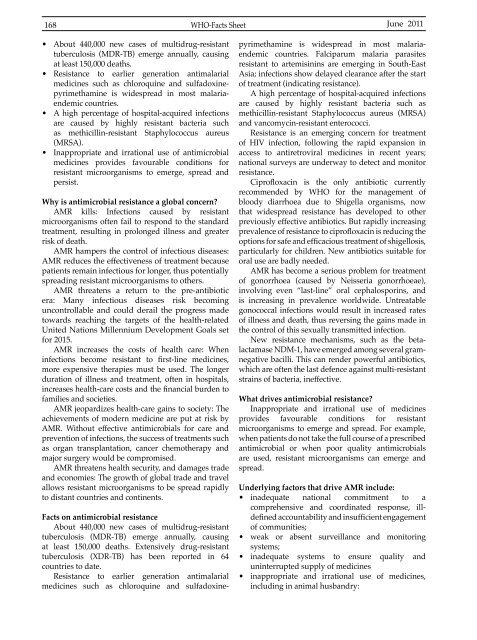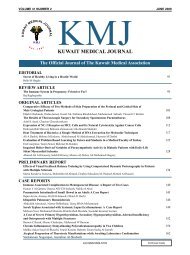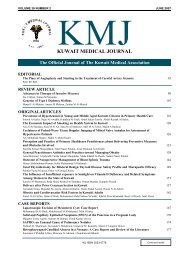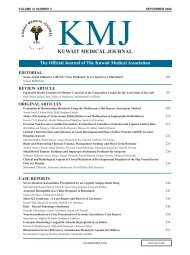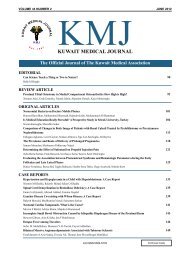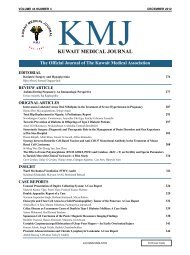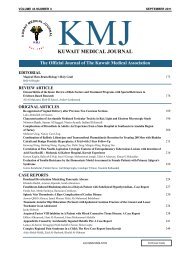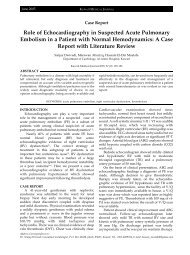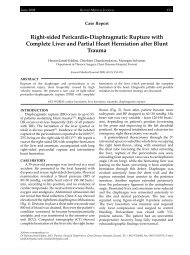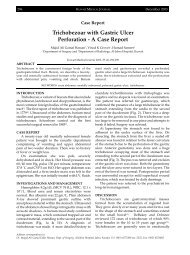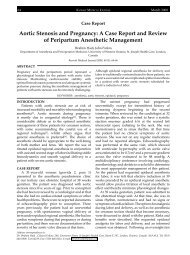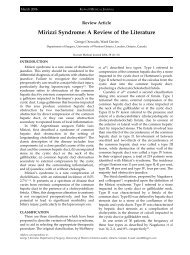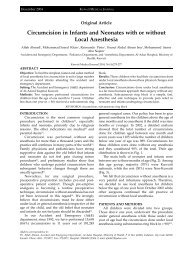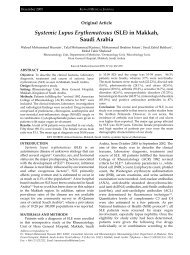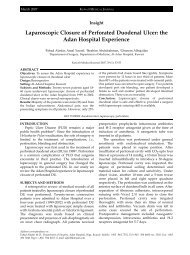Vol 43 # 2 June 2011 - Kma.org.kw
Vol 43 # 2 June 2011 - Kma.org.kw
Vol 43 # 2 June 2011 - Kma.org.kw
Create successful ePaper yourself
Turn your PDF publications into a flip-book with our unique Google optimized e-Paper software.
168<br />
WHO-Facts Sheet <strong>June</strong> <strong>2011</strong><br />
• About 440,000 new cases of multidrug-resistant<br />
tuberculosis (MDR-TB) emerge annually, causing<br />
at least 150,000 deaths.<br />
• Resistance to earlier generation antimalarial<br />
medicines such as chloroquine and sulfadoxinepyrimethamine<br />
is widespread in most malariaendemic<br />
countries.<br />
• A high percentage of hospital-acquired infections<br />
are caused by highly resistant bacteria such<br />
as methicillin-resistant Staphylococcus aureus<br />
(MRSA).<br />
• Inappropriate and irrational use of antimicrobial<br />
medicines provides favourable conditions for<br />
resistant micro<strong>org</strong>anisms to emerge, spread and<br />
persist.<br />
Why is antimicrobial resistance a global concern<br />
AMR kills: Infections caused by resistant<br />
micro<strong>org</strong>anisms often fail to respond to the standard<br />
treatment, resulting in prolonged illness and greater<br />
risk of death.<br />
AMR hampers the control of infectious diseases:<br />
AMR reduces the effectiveness of treatment because<br />
patients remain infectious for longer, thus potentially<br />
spreading resistant micro<strong>org</strong>anisms to others.<br />
AMR threatens a return to the pre-antibiotic<br />
era: Many infectious diseases risk becoming<br />
uncontrollable and could derail the progress made<br />
towards reaching the targets of the health-related<br />
United Nations Millennium Development Goals set<br />
for 2015.<br />
AMR increases the costs of health care: When<br />
infections become resistant to first-line medicines,<br />
more expensive therapies must be used. The longer<br />
duration of illness and treatment, often in hospitals,<br />
increases health-care costs and the financial burden to<br />
families and societies.<br />
AMR jeopardizes health-care gains to society: The<br />
achievements of modern medicine are put at risk by<br />
AMR. Without effective antimicrobials for care and<br />
prevention of infections, the success of treatments such<br />
as <strong>org</strong>an transplantation, cancer chemotherapy and<br />
major surgery would be compromised.<br />
AMR threatens health security, and damages trade<br />
and economies: The growth of global trade and travel<br />
allows resistant micro<strong>org</strong>anisms to be spread rapidly<br />
to distant countries and continents.<br />
Facts on antimicrobial resistance<br />
About 440,000 new cases of multidrug-resistant<br />
tuberculosis (MDR-TB) emerge annually, causing<br />
at least 150,000 deaths. Extensively drug-resistant<br />
tuberculosis (XDR-TB) has been reported in 64<br />
countries to date.<br />
Resistance to earlier generation antimalarial<br />
medicines such as chloroquine and sulfadoxinepyrimethamine<br />
is widespread in most malariaendemic<br />
countries. Falciparum malaria parasites<br />
resistant to artemisinins are emerging in South-East<br />
Asia; infections show delayed clearance after the start<br />
of treatment (indicating resistance).<br />
A high percentage of hospital-acquired infections<br />
are caused by highly resistant bacteria such as<br />
methicillin-resistant Staphylococcus aureus (MRSA)<br />
and vancomycin-resistant enterococci.<br />
Resistance is an emerging concern for treatment<br />
of HIV infection, following the rapid expansion in<br />
access to antiretroviral medicines in recent years;<br />
national surveys are underway to detect and monitor<br />
resistance.<br />
Ciprofloxacin is the only antibiotic currently<br />
recommended by WHO for the management of<br />
bloody diarrhoea due to Shigella <strong>org</strong>anisms, now<br />
that widespread resistance has developed to other<br />
previously effective antibiotics. But rapidly increasing<br />
prevalence of resistance to ciprofloxacin is reducing the<br />
options for safe and efficacious treatment of shigellosis,<br />
particularly for children. New antibiotics suitable for<br />
oral use are badly needed.<br />
AMR has become a serious problem for treatment<br />
of gonorrhoea (caused by Neisseria gonorrhoeae),<br />
involving even “last-line” oral cephalosporins, and<br />
is increasing in prevalence worldwide. Untreatable<br />
gonococcal infections would result in increased rates<br />
of illness and death, thus reversing the gains made in<br />
the control of this sexually transmitted infection.<br />
New resistance mechanisms, such as the betalactamase<br />
NDM-1, have emerged among several gramnegative<br />
bacilli. This can render powerful antibiotics,<br />
which are often the last defence against multi-resistant<br />
strains of bacteria, ineffective.<br />
What drives antimicrobial resistance<br />
Inappropriate and irrational use of medicines<br />
provides favourable conditions for resistant<br />
micro<strong>org</strong>anisms to emerge and spread. For example,<br />
when patients do not take the full course of a prescribed<br />
antimicrobial or when poor quality antimicrobials<br />
are used, resistant micro<strong>org</strong>anisms can emerge and<br />
spread.<br />
Underlying factors that drive AMR include:<br />
• inadequate national commitment to a<br />
comprehensive and coordinated response, illdefined<br />
accountability and insufficient engagement<br />
of communities;<br />
• weak or absent surveillance and monitoring<br />
systems;<br />
• inadequate systems to ensure quality and<br />
uninterrupted supply of medicines<br />
• inappropriate and irrational use of medicines,<br />
including in animal husbandry:


